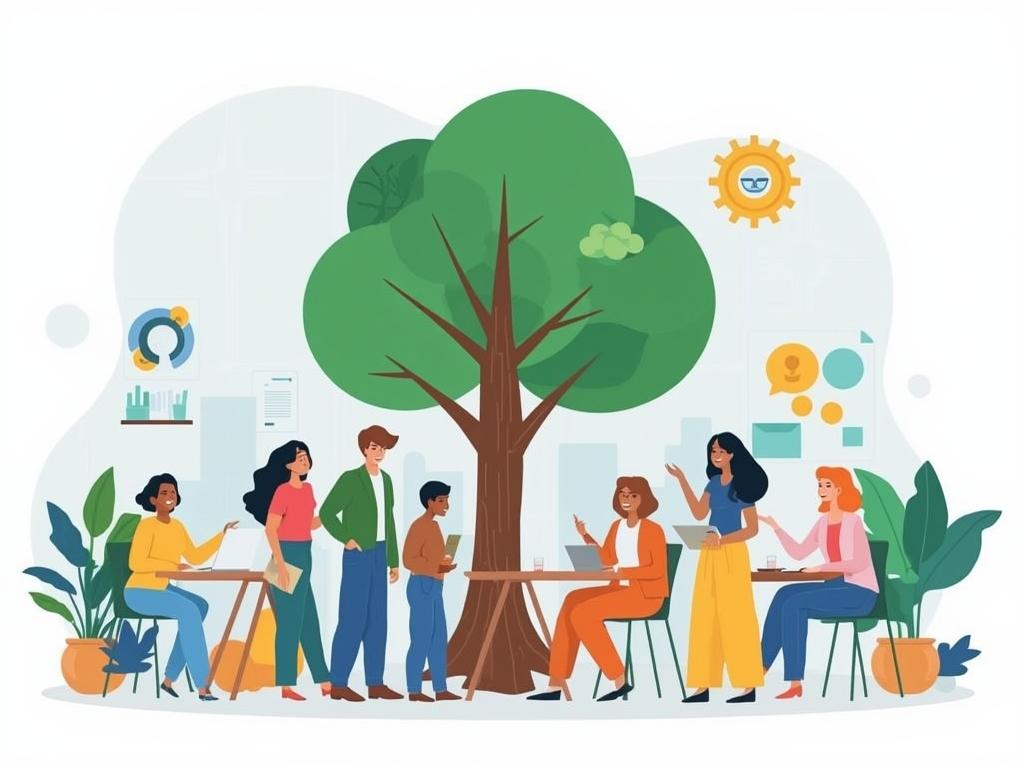Have you ever stopped to think that that volunteer experience on that social project could be just the thing you need to make your CV memorable? Many candidates underestimate the power of volunteer work, treating it as a mere supplement when, in reality, it could be the key that opens doors in the competitive job market. Turning volunteering experiences into a competitive advantage is not about listing activities, but about demonstrating how these experiences have shaped skills that are valued by any employer.
Imagine this situation: two candidates with identical academic backgrounds apply for the same job. One of them simply mentions "volunteering" on his CV, while the other details how he coordinated a team of 20 people in a fundraising campaign, managed a limited budget and developed communication strategies that increased fundraising by 50%. Which one would catch your attention more? The difference lies in ability to translate experience into measurable and relevant skills. This article will guide you step by step through this process of valorization, showing you how to get the most out of your solidarity experiences.
Why is it that so many professionals don't give this topic its due importance? Volunteering is often seen as an act disconnected from one's career, when in fact it is fertile ground for developing technical and behavioral skills. From leadership and conflict resolution to project management and adaptability, the opportunities are vast. Let's explore how you can stop burying these gems at the end of your CV and start positioning them as central arguments in your professional narrative.
Identifying the Skills Developed in Volunteering
The first crucial step is to take a deep dive into your volunteer experiences to identify which skills you have really developed. It's not just about what you did, but how it contributed to your professional growth. Think of challenging situations: how did you deal with tight deadlines to organize an event? How did you resolve conflicts between team members? What communication skills were needed to engage the community?
Let's take a concrete example: suppose you volunteered on a tutoring project for children. Apart from the obvious "patient and dedicated", you probably developed ability to adapt to explain the same content in different ways, creativity to engage students and emotional intelligence to understand their individual difficulties. These are extremely valuable skills in any corporate environment, especially in positions that require training, sales or people management.
How about doing a practical exercise now? Take out a piece of paper and write down all your volunteer experiences, however brief they may have been. For each one, answer: what was the biggest challenge? How did I overcome it? What concrete results did we achieve? This reflection will be fundamental for the next step. If you need help mapping competencies, platforms such as Tied offer great tools for self-evaluation.
Advertising
The Art of Narrating Experiences with Measurable Results
Now that you've identified your competencies, it's time for the most neglected step: turning them into impactful narratives with concrete results. Instead of writing "I volunteered at an animal shelter", try "Coordinated the logistics of adopting 50 animals in 3 months, implementing a screening system that reduced processing time by 30%". See the difference? The second option tells a story of efficiency, management and impact.
How do you translate this into the context of volunteering? Think about numbers, percentages, deadlines and scales. How many people did you mobilize? How much did you increase your fundraising? Did you optimize a process that saved time or resources? This data turns a subjective experience into a tangible success story. Remember: numbers tell stories that words alone cannot.
Let's simulate a situation: you organized a charity bazaar. Instead of saying "I helped organize it", you could write "Led the team of 8 volunteers in the charity bazaar that raised R$15,000, 40% more than the previous edition, by implementing a new pricing strategy and promoting it on social media". This description not only demonstrates leadership, but also strategic thinking and the ability to generate results. Need some inspiration? O Voluntários.com.br has several success stories that can stimulate your creativity.
Strategic positioning on your CV and LinkedIn
Where and how you position these experiences makes all the difference to the recruiter's perception. Burying volunteering at the end of the CV, after "other activities", sends out the message that you don't value these experiences. Instead, consider integrating them into the professional experiences section or creating a specific section entitled "Leadership and Volunteering Experiences" - especially if they are relevant to the position you are applying for.
On LinkedIn, the approach can be even more strategic. Include your volunteer experiences in the "Experience" section with the same results-rich descriptions as you did for your CV. Use keywords related to the skills developed to increase your visibility to recruiters who use screening systems. Also, ask for recommendations from project coordinators - a testimonial about your proactivity or leadership is just as valuable as a corporate recommendation.
How about using storytelling to your advantage? In the "About" field on LinkedIn, you could include a brief mention of how volunteering has shaped your professional outlook. Something like "My experience coordinating social projects taught me that efficient management and purpose go hand in hand - a lesson I apply daily in my corporate projects". This approach directly connects your volunteer experience with your professional ambitions. To fully optimize your profile, explore the tips from LinkedIn's own platform.
From the Job Interview: How to Talk About Volunteering with Confidence
When it comes to the interview stage, be prepared to talk about your volunteer experiences with the same naturalness and conviction as you would about a formal job. Many candidates are hesitant to mention volunteering, as if it were a "minor" experience - but this is a trap you should avoid at all costs. Practice answers that explicitly connect the skills you developed while volunteering with the job requirements.
If the interviewer asks "Tell me about a time you dealt with a conflict in the team", don't hesitate to use an example from your volunteering. Describe the situation, the action you took and the positive result achieved. This response methodology, known as STAR (Situation, Task, Action and Result), is extremely effective to structure their experiences, regardless of whether they were in paid or unpaid contexts.

What if you're worried that the interviewer might underestimate your volunteer experience? Anticipate this objection and prepare an assertive response: "Although this experience was unpaid, it provided me with challenges equivalent to those of a corporate environment, such as managing a limited budget, leading multidisciplinary teams and pressure for tangible results". This attitude demonstrates professional maturity and an understanding of the real value of your experiences. To prepare yourself better, check out the interview simulations from In Practice.
Volunteering as a Career Transition Strategy
For professionals in career transition, volunteering can be the smartest bridge between where you are and where you want to go. Let's say you work in administration but want to move into marketing - looking for a volunteer position that involves content creation, social media management or campaign planning for an NGO offers much-needed practical experience. This approach allows you to build a relevant portfolio while still keeping your current job.
The beauty of this strategy lies in its flexibility: you can start with a few hours a week, taking on specific projects that develop exactly the skills you need to prove. As you gain experience and demonstrate results, you can take on greater responsibilities, thus creating a growing track record of achievements in the new area. It's like a free proving ground where your mistakes cost less and your successes turn into valuable cases.
Imagine you want to leave the financial sector and enter the area of social impact. Volunteering to help a non-profit organization with its financial management not only keeps your skills sharp, it also builds relationships in the desired sector and demonstrates your genuine commitment to the cause. Many organizations, such as eSolidar, connect professionals to volunteer opportunities that combine expertise with social need.
Authentic Networking and Hidden Opportunities
One of the most underestimated benefits of volunteering is the access to genuine and diverse networking. Unlike professional events where everyone is "selling" something, in the volunteer environment relationships are built on shared values and real collaboration. The connections you make while working for a cause can open doors you never even imagined - even for professional opportunities that are not publicly available.
Think about it: as you dedicate your time to a cause, you meet professionals from different fields, many of whom may occupy influential positions in your companies. These people witness first-hand your work ethic, your skills and your character - much more powerful references than any formal letter of recommendation. How many stories have you heard of volunteers who were recommended for vacancies by other members of the organization?
The key is to approach volunteering with authenticity - not as a calculating strategy to make contacts, but as a genuine opportunity to contribute while building meaningful relationships. Participate actively, offer your expertise, collaborate beyond your minimum obligations. Platforms like Voluntariar can help you find opportunities aligned with your interests and skills. Who knows, maybe your next professional opportunity is waiting for you in a project that also warms your heart?
Turning the Recruiter's Eye: From Doubt to Advantage
Finally, it's essential to understand how modern recruiters view volunteering on the CV - and how you can influence that perception. While some may still have outdated views, most up-to-date HR professionals recognize the tremendous value of these experiences. A candidate with a consistent volunteer background demonstrates proactivity, community engagement and often develops more advanced soft skills than their peers who only followed the traditional path.
When a recruiter sees volunteerism well described on a CV, they see signs of a multidimensional professional: someone who manages their time efficiently, who is passionate about causes beyond their salary, who is likely to have better emotional intelligence and adaptability. These qualities are particularly valued in leadership positions and in companies with a strong organizational culture. You're showing that you're more than your job - you're an engaged citizen.
What if you're worried about possible gaps in your CV? Volunteering may be your best strategy for explaining periods between jobs in a positive way. Instead of a "gap year", you could describe a "period of developing project management skills through intensive voluntary work". This rewording turns a possible vulnerability into an argument of strength. How about revisiting your CV today with these new eyes?
The Call to Action: Your Next Practical Step
Now that you understand the transformative power that volunteering can have on your career path, it's time to take concrete action. How about taking 30 minutes this week to review your CV through the lenses we've discussed? Identify a volunteer experience that you may have underestimated and rewrite it focusing on skills and measurable results. Small adjustments can have a disproportionate impact on recruiters' perceptions.
If you don't have any significant volunteer experience, don't worry - it's never too late to start. Search for organizations whose causes resonate with your values and that offer opportunities aligned with your career goals. Remember: consistency is more valuable than intensity - a regular commitment of a few hours a month to a relevant project builds a more impressive track record than sporadic participation on multiple fronts.
Today's job market values complete professionals who combine technical expertise with emotional intelligence, purpose and adaptability. Your volunteering experiences, when well communicated, tell exactly that story about you. They show that you are the kind of professional who doesn't wait for opportunities to fall from the sky - but who creates them through action and meaningful contribution. Your journey to turn altruism into a competitive advantage starts now - how about taking the first step?



